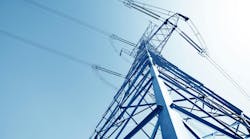IEEE presented its prestigious Uno Lamm award to Willis “Bill” Long at its Power & Energy Society General Meeting on July 22 for “the leadership and relevant contributions to the spread of knowledge and promotion of HVDC technology.” The Uno Lamm Award is not the only award Long has won during his lifetime of achievement in the power industry. Yet, he will tell you that it is the strong support from family and the lifetime friends and colleagues that have contributed to his success.
Long is currently professor emeritus for the department of engineering professional development at University of Wisconsin Madison. He is also emeritus at the electrical and computer engineering department. His main role for the past five years has been developing continuing education courses for power system engineers.
According to Gene Wolf, chairman of the Power & Energy Society's T&D Committee, the Uno Lamm award is the highest HVDC award given. “It has been around since 1980, and the list of winners is a who’s who of HVDC greats.”
HVDC “great” Bill Long has contributed to the industry in different ways. From his involvement with IEEE and CIGRE to his industry experience to his long teaching career, Long said he “doesn’t do this kind of thing alone.”
As an instructor, Long tells his students that they should anticipate changing positions and career objectives throughout their professional lives. Long’s changes have led him to where he is today. After receiving his B.S. in engineering physics and M.S. in electrical engineering from the University of Toledo, he earned a PhD from the University of Wisconsin Madison.
He began his initial work in high-voltage direct current transmission.at Hughes Aircraft Co. Research Laboratories in Malibu, California. He joined Hughes in 1969 as a member of the technical staff of the High-Voltage Systems Program. He worked on EMTP simulation of field tests on the Pacific HVDC Intertie for DC circuit breaker development and the construction of a 100-kV test laboratory.
His next change, or move, was to the University of Wisconsin Madison in 1973. He taught undergraduate and graduate courses and conducted HVDC research for EPRI, the U.S. Department of Energy, and others. “My temperament was better suited to university life than the vagaries of aerospace life where one follows contracts from company to company,” Long said.
Then in 1983, he joined ASEA (now ABB) while on leave from the university. As the director of the Power Systems Center in New Berlin, Wisconsin, he was responsible for technical and managerial activities at the center, a new facility for the analysis and simulation of integrated AC/DC power systems.
“There has been a continual interplay between the teaching and industrial experience,” Long said. “That matches perfectly with the continuing education courses because one is more adept at offering classes to industry people if one has been in the industry.”
Long said that teaching continuing education courses is like being your own boss, “but you’re responsible to the students. It’s very enjoyable, working with students, whether they’re undergraduate students or utility people.”
Long not only teaches professional engineers, he also teaches math to grade schoolers. He works with advanced students in second through fifth grades—“future engineers and scientists.”
Long will be directing a CE course coming Nov. 17-19 on Advanced Topics in Power System Protection. “It goes beyond the fundamentals of power system protection into the more advanced things that you would look at on a large interconnected system,” Long said.
The course will cover simulation of dynamic phenomena, the use of EMTP in relay application studies and voltage stability.
“Large, interconnected systems have problems that can be solved,” Long said about the course. “You’re not at the mercy of the system; there are tools that you can use and imagination that you can exercise to make the system behave the way it should. You should be able to head off a large blackout if you’re looking at the system and you understand how it works.”
So professionals only need to go as far at Madison, Wisconsin, to find an award-winning instructor of power systems. The other awards that Long has won include the IEEE Educational Activities Board Meritorious Achievement Award in Continuing Education (in 1992). In 1996, he received the UW College of Engineering's Ragnar E. Onstad Award for Service to Society. He is also a recipient of the 2004 Attwood Associate Award from the U.S. National Committee of CIGRE.

